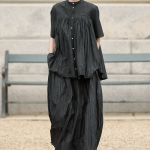“I told (Franz), ‘I don’t want to be nude. But I agreed to play intimacy—sex. So how can we reinvent it?’ And he was really conscious about how I felt,” she says. The result was subtly choreographed moments of fervent love-making—against walls and various other surfaces—that rely on both the actors’ physicality and the way the camera captures their seduction. Before Agathe and Tomas’s first sexual encounter, for instance, the pair find their rhythm on the dancefloor, and then circle each other quietly, almost predatorily, in Agathe’s apartment—finally consummating the affair behind closed doors.
“There was this kind of European way of shooting. It was a really free, open space. We didn’t have a lot of marks on the ground or marks of time. It was an experimental way of making cinema,” Exarchopoulos says.
The chemistry between the actors—including between Rogowski and Whishaw, who share a two-minute sex scene that likely earned the film its confounding NC-17 rating—seems all the more impressive, given they didn’t spend much time together before filming. Sachs is known for eschewing rehearsals in order to encourage creativity and spontaneity as the cameras roll, and in his eighth feature’s talented ensemble, he seems to have found a particularly like-minded group. “Even if you (have) three coffees and go to two restaurants, you never know what is inside people,” Exarchopoulos says of meeting her costars on set. “Sometimes, when you catch them at the moment where you have to share something deep and intimate, it’s even more fearless and powerful to act in this way.”
The first scene that the three stars shot together was the one at the party that opens the film, which, for Exarchopoulos, called to mind making Blue Is the Warmest Colour: “The first week of shooting was the sex scenes,” she remembers. “And I think it really helped the rest of the shoot, because Léa (Seydoux) and I were facing being really naked in front of each other and, of course, it broke down our boundaries.”
Likewise, she says, Passages “is a movie about the flesh, about desire. So to go straight to the point where we met—the dance scene—helped us to not be frustrated by our fears and to just jump into the adventure.” And yet, as the film’s three lovers discover, connecting with someone on the dancefloor or in the nude only affords so much insight. “It still doesn’t mean that you know everything about the person,” Exarchopoulos says.



